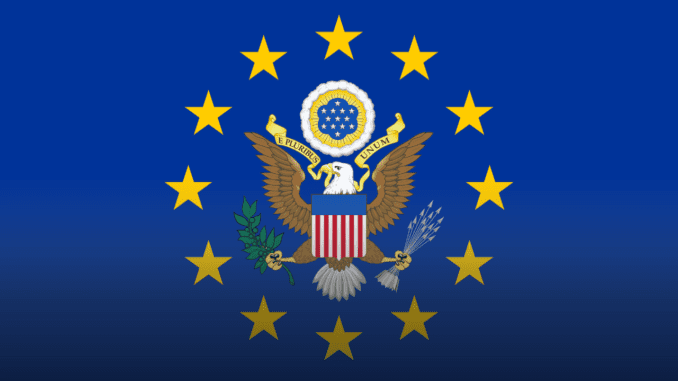
Tensions Rise as Vance and Hegseth Criticize European “Free-Loading”
By Oshadhi Gimesha, Lead Journalist | Editor-in-Chief Approved
A Look at U.S.-Europe Tensions
A leaked text exchange between U.S. Vice President JD Vance and Secretary of Defense Pete Hegseth has sparked concern on March 26, 2025. The two leaders expressed frustration with European allies, calling their reliance on the U.S. “pathetic.” European leaders have stayed quiet, raising questions about the future of U.S.-Europe ties. For American and global audiences, this highlights growing strains in a key alliance.
Key Points
- Vance and Hegseth criticized Europe in leaked texts on March 26, 2025.
- They called European reliance on U.S. security efforts “pathetic.”
- European leaders have not responded publicly, despite the harsh words.
A Rift in the Alliance
On March 26, 2025, a leaked text exchange revealed tensions between the U.S. and its European allies. Vice President JD Vance and Secretary of Defense Pete Hegseth shared their frustration in a Signal group chat with top U.S. security officials. Vance questioned U.S. leadership in Red Sea security operations against Houthi attacks. He noted that only 3% of U.S. trade uses the Suez Canal, compared to 40% for Europe. The canal connects the Mediterranean to the Red Sea, linking Europe, the Middle East, and Asia. Vance said the public might not understand this imbalance. He added that he wasn’t sure President Donald Trump realized how this clashed with his stance on Europe. “I just hate bailing Europe out again,” Vance wrote. Hegseth replied, “I fully share your loathing of European free-loading. It’s PATHETIC.”
US Vice President and Secretary of Defense loathe Europe (as they try to extort money out of it).
— Mike Martin MP 🔸 (@ThreshedThought) March 24, 2025
I wonder how much more evidence the UK government needs that Trump et al are deeply unreliable and we need to pivot towards Europe. pic.twitter.com/YEFOHMnEWe
The comments came after Trump ordered more U.S. strikes on the Iran-backed Houthi group in Yemen. The Houthis have attacked merchant ships in the Red Sea since the Hamas attacks on Israel on October 7, 2023. Despite the harsh words, European leaders have stayed silent. The U.S. has been working with allies like the UK to counter the Houthis. The UK has joined U.S. strikes over the past two years, helping reduce Houthi threats. A British official said the U.S. remains their closest ally, and they cooperate deeply on defense and security. The UK has also increased defense spending and committed troops to a future Ukrainian peacekeeping force. France echoed this, saying it will keep working with Washington. But some in Europe are upset. A UK political leader said on social media that Vance and his team aren’t fit to lead the world’s strongest military.
JD Vance and his mates clearly aren’t fit to run a group chat, let alone the world’s strongest military force. It has to make our security services nervous about the intelligence we’re sharing with them.
— Ed Davey (@EdwardJDavey) March 24, 2025
Why This Matters Now
The leaked texts on March 26, 2025, come at a tense time for U.S.-Europe relations. The U.S. has long led security efforts, like those in the Red Sea. But Vance and Hegseth’s words show growing frustration with this role. An expert in London said Europe does rely heavily on the U.S. to handle threats like the Houthis. He called Europe’s military capabilities weak, saying they couldn’t manage such a situation alone. This reliance makes it hard for Europe to push back, even if they dislike the comments. Some U.S. officials suggested they might demand more economic benefits for leading these operations, which upset British lawmakers.
For the U.S., where alliances are key, this could strain ties further. In Germany and France, where U.S. support has been vital, leaders are likely weighing their next steps. Canada, a close U.S. partner, might feel the ripple effects. The UK and the Netherlands, active in Red Sea operations, face pressure to respond. Australia, with its security concerns, sees the risks of a fractured alliance. If tensions ease by January 1, 2026, cooperation might improve. But if they worsen, global security could take a hit.
Wins and Losses
The U.S. gains leverage with the comments on March 26, 2025. Pushing Europe to step up could lead to more burden-sharing by June 1, 2025. But European allies lose trust. The harsh words might weaken unity, possibly by January 1, 2026. The Houthis win as focus shifts from their attacks to U.S.-Europe drama.
Smaller nations relying on U.S. support might face uncertainty. In the U.S. and Canada, where alliances matter, this raises a question: can both sides rebuild trust? For now, the silence speaks volumes.
What’s Next for U.S.-Europe Ties?
If Europe boosts its defense efforts by June 1, 2025, ties might strengthen by 2026. But if the rift grows, global security could suffer. For U.S. and global audiences, it’s a choice: mend the alliance or risk bigger divides? France, Australia, and others are watching closely. Strong partnerships are key. News Zier will keep tracking this story as it develops.
All facts are independently verified, and our reporting is driven by accuracy, transparency, and integrity. Any opinions expressed belong solely to the author. Learn more about our commitment to responsible journalism in our Editorial Policy.




